 |
| Located on the top of the "Bulbul" mountain 9 km ahead of Ephesus, the shrine of Virgin Mary enjoys a marvelous atmosphere hidden in the green. It is the place where Mary may have spent her last days. Indeed, she may have come in the area together with Saint John, who spent several years in the area to spread Christianity. Mary preferred this remote place rather than living in crowded place. The house is a typical Roman architectural example, entirely made of stones. |
|
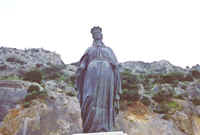 |
|
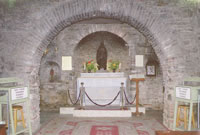 |
|
In the 4th century AD, a church, combining her house and grave, has been built. The original two-stored house, which consisted of an anteroom (where today candles are proposed), bedroom and praying room (Christian church area) and a room with fireplace (chapel for Muslims). A front kitchen fell into ruins and has been restored in 1940's. Today, only the central part and a room on the right of the altar are open to visitors. |
|
| From there one can understand that this building looks more like a church than a house. Another interesting place is the "Water of Mary", a source to be found at the exit of the church area and where a rather salt water, with curative properties, can be drunk by all. |
|
| Paul VI was the first pope to visit this place in the 1960's. Later, in the 1980's, during his visit, Pope John-Paul II declared the Shrine of Virgin Mary has a pilgrimage place for Christians. It is also visited by Muslims who recognize Mary as the mother of one of their prophets. Every year, on August 15th a ceremony is organized to commemorate Mary's Assumption. Especially on August 15th, 2000, an organization has planned to celebrate also Jesus' 2000th birthday. |
|
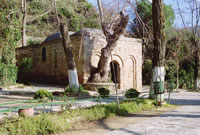 |
|
| The visions of Sister Emmerich, as recorded by Brentano, occupy several volumes and are mostly concerned with events from the life of Christ and of Mary. Only a few are devoted to Mary's final day in Ephesus, and those few follow no logical or even chronological sequence, tending to be circular rather than linear, creating and then clarifying ambiguities, so that in highly condensed version that follows we have taken the liberty of reorganizing and summarizing Sister Emmerich's visions to help you see more clearly exactly what she saw.
THE LOCATION OF THE HOUSE
"Mary did not live in Ephesus itself, but on a hill to the left of the road from Jerusalem... Narrow paths from Ephesus lead southwards to it... It is a very lonely place, but has many fertile slopes as well as rock caves where several Christian families and friends of Mary already lived... John had a house built for her here...
It is on an uneven plateau near the top of the hill, overgrown with trees and wild bushes... There were Jewish as well as Christian settlers here, living in caves fitted out with woodworks or in huts or tents... It was like a scattered village... Mary's house was the only one built of stone... A little way behind it was the summit of the hill, from which one could see Ephesus and also the sea with its many islands... Near here is a castle inhabited by a king who seems to have been deposed... Behind the house Mary had built a Way of the Cross soon after her arrival... |
|
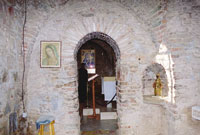 |
|
It had twelve Stations... Mary paced out the measurements herself... At each Station she set up memorial stones - eight smooth stones with many sides, each resting on a base of the same stone... The stones and their bases were all inscribed with Hebrew letters... These Stations were all in little hollows, except the Station of Month Calvary which was on a hill... The Station of the Holy Sepulcher was in a little cave over this hill..." |
|
| THE HOUSE ITSELF
"It was built of regular stones, rounded at the back, and had a spring running under it... The windows were high up near the flat roof... The main part of the house was divided into two by the fireplace in the middle of it, sunk into the ground, facing the door... There was a deep channel in the wall, like half of a chimney, which carried the smoke up an opening in the ceiling... Behind the fireplace, the apse of the room was curtained off and formed Mary's oratory... In a niche in the center of the wall there was a receptacle like a tabernacle and in it stood a cross about the length of a man's arm...
To the right and left of the fireplace were doors which led into the black part of the house... The door to the right led to the bedchamber of the Blessed Virgin, which ended in a semi-circle... Her couch, which was placed against a niche in the wall, was the length and breath of a narrow plank... Through the door to the left of the oratory was a small room were Mary's clothes and other belongings were kept... She lived here quietly with her maidservant, a younger woman who fetched what little food they needed... John would visit them when he was not away on his travels..." |
|
| MARY'S DEATH AND BURIAL
"I saw her lying on a low, very narrow couch in her little sleeping alcove... Her head rested on a round cushion... She was very weak and pale. The assembled Apostles held a service in front part of the house... Peter stood in priestly vestments before the altar, with the others behind him as if in a choir... |
|
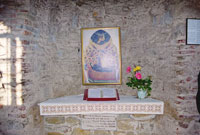 |
|
| I saw the Blessed Virgin being lifted up several times a day by the women to be given a spoonful of juice which had been pressed from a bunch of yellow berries... Newcomers tenderly embraced those who were already there... After their feet had been washed, they approached Mary's couch and greeted her with reverence... She could only say a few words to them... Towards evening she realized that her end was approaching and said farewell to the Apostles, disciples and women who were present... She lay back on her pillows, pale and still... Peter gave her Holy Communion... She died after the ninth hour, at the same time as Our Lord...
Matthew and Andrew then followed Mary' Way of the Cross until the last Station, half and hour's journey from the house, which was the cave representing the Holy Sepulcher... Here they worked to enlarge the tomb and to built a door with which to close the entrance... Women came to the house to prepare the body for burial, bringing with them clothes as well as spices to embalm the body... The house was closed and they worked lamplight... Two women washed the holy body... John carried a vessel with ointment... |
|
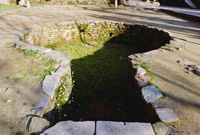 |
|
Peter dipped a finger of his right hand into it and anointed the breast, hands and feet of the Blessed Virgin, praying as he did so... Bunches of myrrh were laid in the armpits and bosom and in the spaces between the shoulders and the neck, chin and cheeks... They wrapped the holy body in a great grave-cloth and placed it in the wicker coffin which stood near... On her breast was laid a wreath of red, white and sky-blue flowers... |
|
| The coffin was then taken to the cave where she was buried". The date of Mary's death perhaps fades in importance when Sister Emmerich tells us that after Mary's entombment St John took St Thomas, who had arrived late, to see the Virgin one last time. Once inside the cave, they knelt and St John opened the lid of the coffin. Mary's body was not in the burial shroud, but the shroud remained intact. They carefully covered up the entrance to the cave and left. |
|
|
 |
|
|
|
